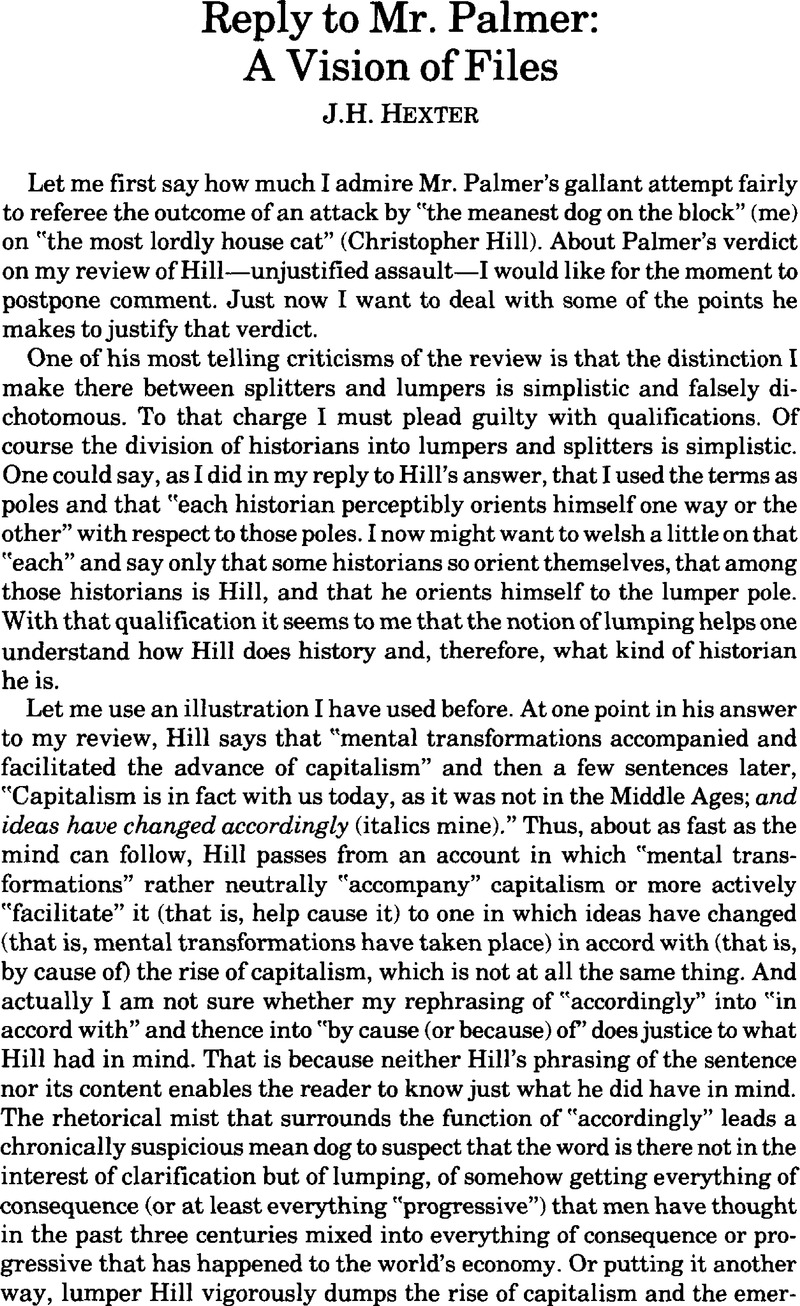No CrossRef data available.
Article contents
Reply to Mr. Palmer: A Vision of Files
Published online by Cambridge University Press: 10 January 2014
Abstract

- Type
- Reply
- Information
- Copyright
- Copyright © North American Conference of British Studies 1979
References
1 Actually, only three Puritans and one non-Puritan.
2 As Hill quite justifiably observed, the social composition of the congregation to which seventeenth-century Puritan ministers preached was beside the point, since, once printing was invented, a preacher's public was not limited to his auditors. This fact might have been expected to penetrate my thick skull as I myself leafed through the bulky seventeenth-century quartos of Perkins and Adams and Greenham. By a miracle of obtusity it did not.
3 For example, the quite oblique and irrelevant references to Hill's Marxist credentials. In no direct way was my critique of Hill related to his Marxism and its slow but significant metamorphosis. Over the years, however, I have been explicit in my aversion to and rejection of Marxist interpretations of the historical episodes to which I have given attention. Now I am sure that they are mere glittering nonsense, fool's gold; but for a long while I believed they were serious enough to be worth attacking. Naturally enough, when ungracious asides about Hill's support of a Marxist interpretation popped up in an essay that challenged Hill's way of doing history, some readers, including Palmer, assumed that the two were systematically interlinked in the essay. They were not. This is evident in the revised version of the essay that appears in On Historians (Cambridge, Mass., Harvard University Press, 1979)Google Scholar. There I have eliminated all references to Hill's Marxist propensities. The effect on the essay is cosmetic, not substantive. Its arguments stand or, as Palmer would have it, fall quite independently of reference to Hill's substantive philosophy of history.
4 That is indeed what I was actually doing, but that Palmer thought otherwise is scarcely matter for wonder; nor is it his fault, but mine. In the review itself, I noted the difficulties of writing a general critique of a writer so prolific and learned as Hill, and suggested that rather than give attention to all his work, “we will have to try sampling.” To Palmer this seemed to imply that I was proposing to take a random sample from Hill's work, and as that phrase stood it was reasonable for him to think so. Actually I did explain and qualify slightly in the following phrase, stating there that my purpose was “to take a close look at the texture of his [Hill's] erudition, when it is set out to display one of his major themes” (p. 230, italics added). The qualification is important, although in context not conspicuous enough. When he is documenting facts, for example, the outrage expressed by victims of the ecclesiastic courts, Hill's procedure in quotation is immaculate. It is source-mining appropriately deployed. It is when he is providing support for a major theme or hypothesis that his use of evidence renders his conclusions unreliable (see below, pp. 134-35). Perhaps the confusion I caused him will convince Palmer of the soundness of my belief that “failure to find the mot juste can be as damaging as insufficient research (Palmer, p. 123).” It is not merely a matter of writing stylish history, of belle-lettristic high falutin’. I would have spared Palmer a misapprehension and myself the writing of this footnote if I had watched my pen a little more closely in the first place.
5 On this matter at least, Hill and I agree; as far as either of us knows, merchants said nothing to the point. For the convenience of readers, I insert the paragraph in question:
Through this emphasis on the inner conviction which inspired actions, bourgeois lay society could impose its own standards. “God's children look to the spiritual use of those things which the worldlings use carnally,” said Greenham. The actions of the Scribes and Pharisees “were good in themselves, and for others,” said Sibbes; “but the end of them was naught, and therefore both they and their works are condemned.” “Man may with good conscience,” Perkins thought, “desire and seek for goods necessary, whether for nature or for his person, according to the former rules: but he may not desire and seek for goods more than necessary, for if he doth, he sinneth.” (“The former rules” include the convenient provision that “those goods without which a man's estate, condition and dignity … cannot be preserved” are necessary.) The preachers attempted to spiritualize what men were doing anyway, by telling them to do it for the right reasons. One may suspect that their congregations paid more attention to the general permission than to the careful qualifications with which it was hedged around. “They are very hot for the Gospel,” said Thomas Adams of such laymen; “they love the Gospel: who but they? Not because they believe it, but because they feel it: the wealth, peace liberty that ariseth by it.”
6 See, for example, On Historians, pp. 20-25, 103-05, 138-40; More's Utopia: the Biography of an Idea (Princeton: Princeton University Press, 1952)Google Scholar, passim.
7 Here an exception should probably be made for The World Turned Upside Down.




